International Marketing: EasyJet
VerifiedAdded on 2023/06/10
|19
|4951
|261
AI Summary
This report analyzes the case study of EasyJet in India and conducts an external environmental analysis of EasyJet in Europe using PEST analysis. It also includes international marketing research of India and provides strategic recommendations for EasyJet.
Contribute Materials
Your contribution can guide someone’s learning journey. Share your
documents today.
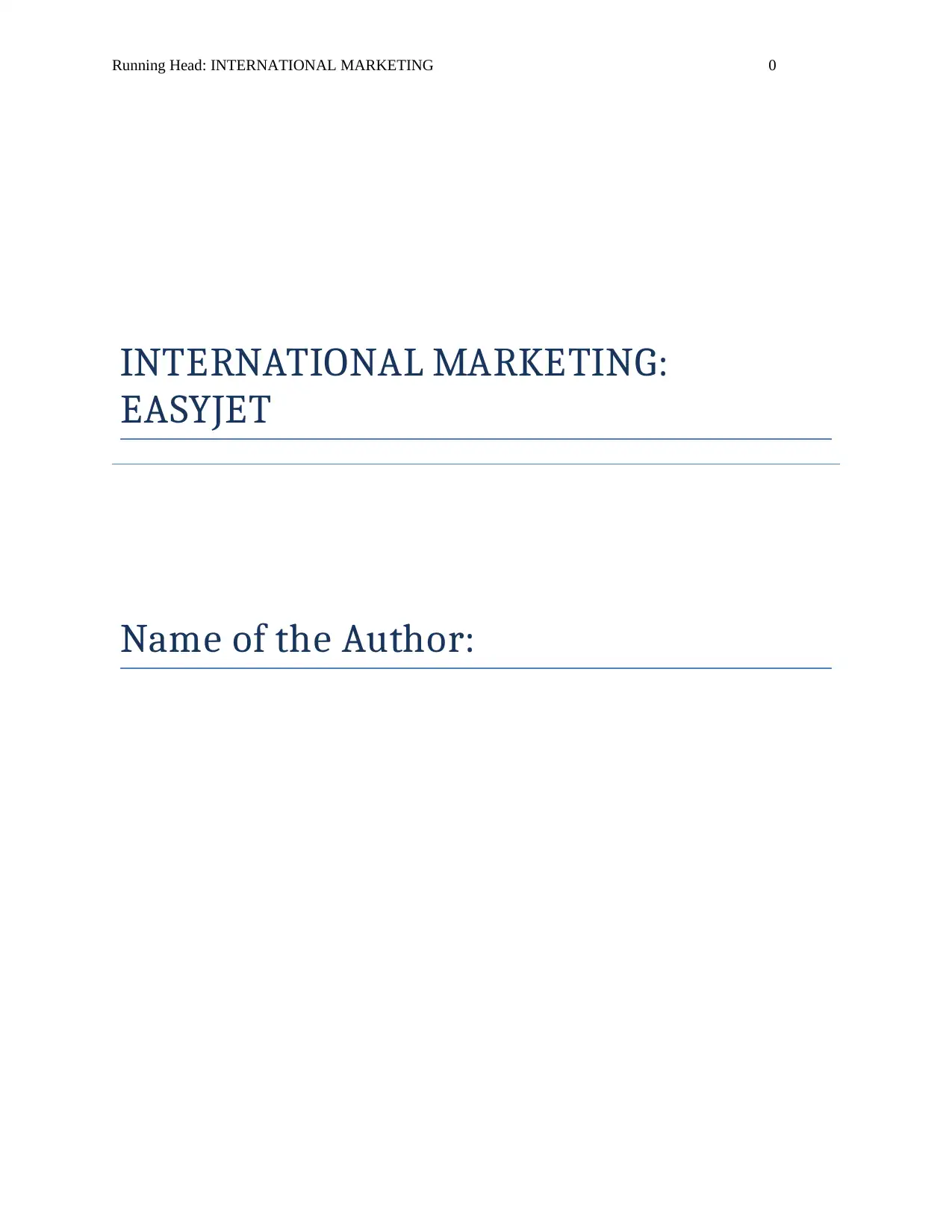
Running Head: INTERNATIONAL MARKETING 0
INTERNATIONAL MARKETING:
EASYJET
Name of the Author:
INTERNATIONAL MARKETING:
EASYJET
Name of the Author:
Secure Best Marks with AI Grader
Need help grading? Try our AI Grader for instant feedback on your assignments.
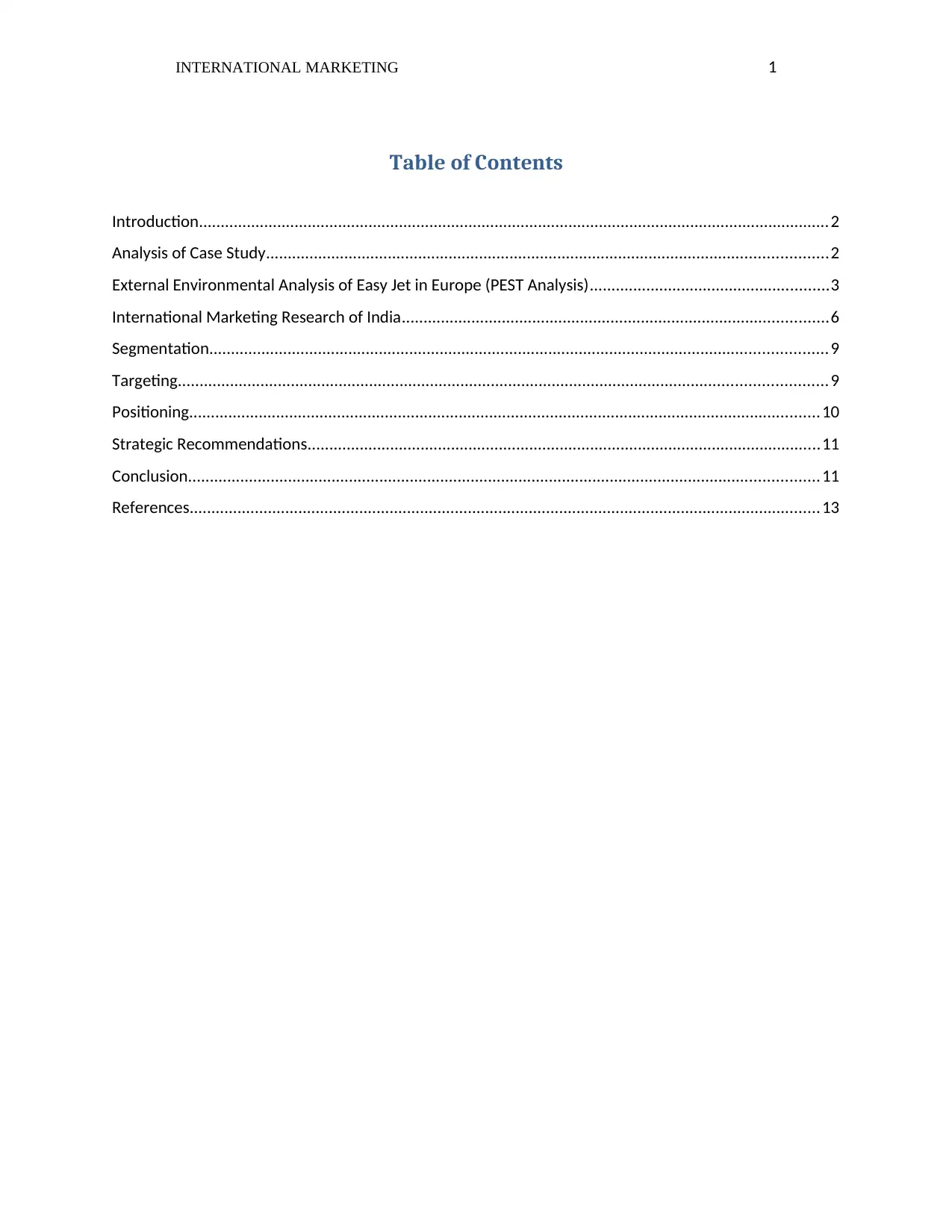
INTERNATIONAL MARKETING 1
Table of Contents
Introduction.................................................................................................................................................2
Analysis of Case Study.................................................................................................................................2
External Environmental Analysis of Easy Jet in Europe (PEST Analysis).......................................................3
International Marketing Research of India..................................................................................................6
Segmentation..............................................................................................................................................9
Targeting.....................................................................................................................................................9
Positioning.................................................................................................................................................10
Strategic Recommendations......................................................................................................................11
Conclusion.................................................................................................................................................11
References.................................................................................................................................................13
Table of Contents
Introduction.................................................................................................................................................2
Analysis of Case Study.................................................................................................................................2
External Environmental Analysis of Easy Jet in Europe (PEST Analysis).......................................................3
International Marketing Research of India..................................................................................................6
Segmentation..............................................................................................................................................9
Targeting.....................................................................................................................................................9
Positioning.................................................................................................................................................10
Strategic Recommendations......................................................................................................................11
Conclusion.................................................................................................................................................11
References.................................................................................................................................................13
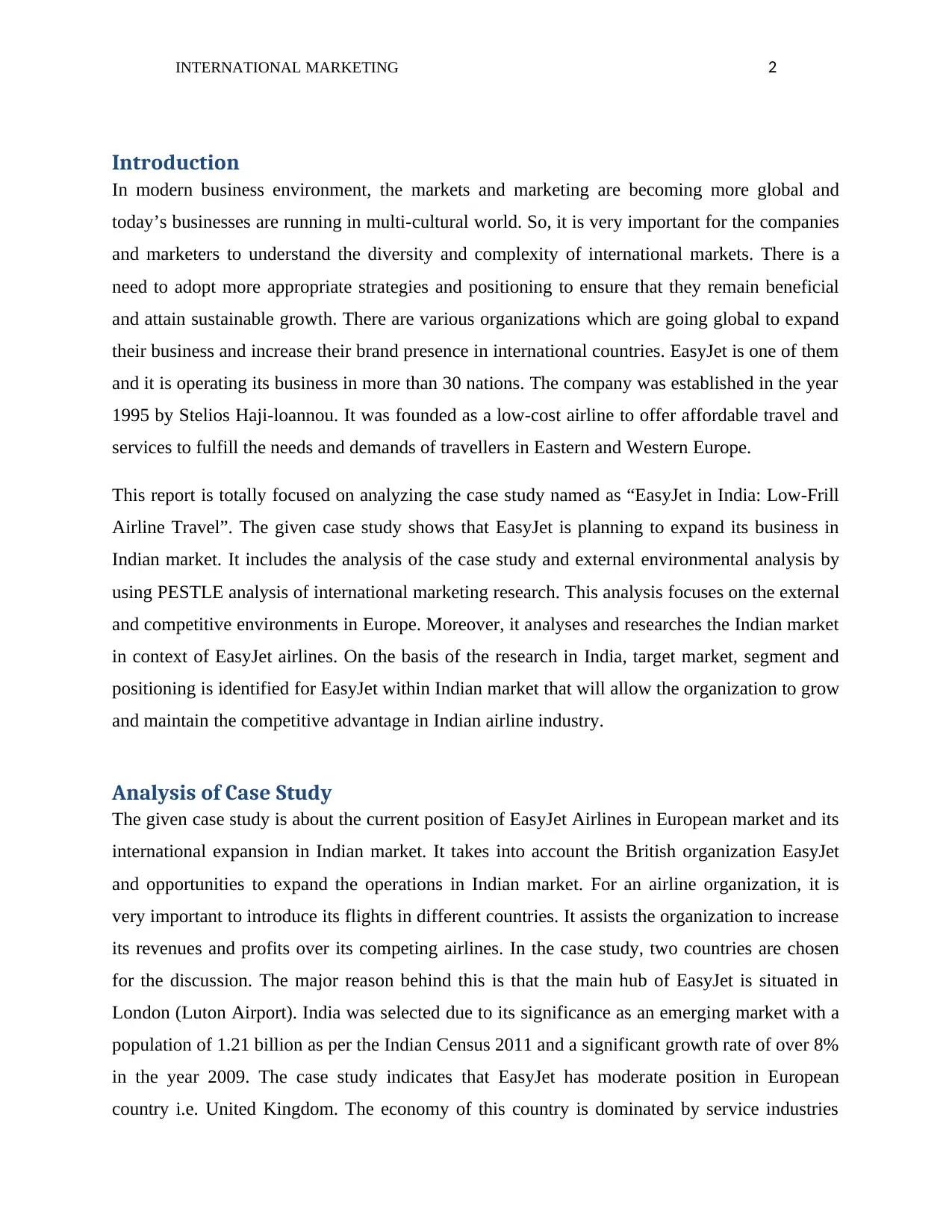
INTERNATIONAL MARKETING 2
Introduction
In modern business environment, the markets and marketing are becoming more global and
today’s businesses are running in multi-cultural world. So, it is very important for the companies
and marketers to understand the diversity and complexity of international markets. There is a
need to adopt more appropriate strategies and positioning to ensure that they remain beneficial
and attain sustainable growth. There are various organizations which are going global to expand
their business and increase their brand presence in international countries. EasyJet is one of them
and it is operating its business in more than 30 nations. The company was established in the year
1995 by Stelios Haji-loannou. It was founded as a low-cost airline to offer affordable travel and
services to fulfill the needs and demands of travellers in Eastern and Western Europe.
This report is totally focused on analyzing the case study named as “EasyJet in India: Low-Frill
Airline Travel”. The given case study shows that EasyJet is planning to expand its business in
Indian market. It includes the analysis of the case study and external environmental analysis by
using PESTLE analysis of international marketing research. This analysis focuses on the external
and competitive environments in Europe. Moreover, it analyses and researches the Indian market
in context of EasyJet airlines. On the basis of the research in India, target market, segment and
positioning is identified for EasyJet within Indian market that will allow the organization to grow
and maintain the competitive advantage in Indian airline industry.
Analysis of Case Study
The given case study is about the current position of EasyJet Airlines in European market and its
international expansion in Indian market. It takes into account the British organization EasyJet
and opportunities to expand the operations in Indian market. For an airline organization, it is
very important to introduce its flights in different countries. It assists the organization to increase
its revenues and profits over its competing airlines. In the case study, two countries are chosen
for the discussion. The major reason behind this is that the main hub of EasyJet is situated in
London (Luton Airport). India was selected due to its significance as an emerging market with a
population of 1.21 billion as per the Indian Census 2011 and a significant growth rate of over 8%
in the year 2009. The case study indicates that EasyJet has moderate position in European
country i.e. United Kingdom. The economy of this country is dominated by service industries
Introduction
In modern business environment, the markets and marketing are becoming more global and
today’s businesses are running in multi-cultural world. So, it is very important for the companies
and marketers to understand the diversity and complexity of international markets. There is a
need to adopt more appropriate strategies and positioning to ensure that they remain beneficial
and attain sustainable growth. There are various organizations which are going global to expand
their business and increase their brand presence in international countries. EasyJet is one of them
and it is operating its business in more than 30 nations. The company was established in the year
1995 by Stelios Haji-loannou. It was founded as a low-cost airline to offer affordable travel and
services to fulfill the needs and demands of travellers in Eastern and Western Europe.
This report is totally focused on analyzing the case study named as “EasyJet in India: Low-Frill
Airline Travel”. The given case study shows that EasyJet is planning to expand its business in
Indian market. It includes the analysis of the case study and external environmental analysis by
using PESTLE analysis of international marketing research. This analysis focuses on the external
and competitive environments in Europe. Moreover, it analyses and researches the Indian market
in context of EasyJet airlines. On the basis of the research in India, target market, segment and
positioning is identified for EasyJet within Indian market that will allow the organization to grow
and maintain the competitive advantage in Indian airline industry.
Analysis of Case Study
The given case study is about the current position of EasyJet Airlines in European market and its
international expansion in Indian market. It takes into account the British organization EasyJet
and opportunities to expand the operations in Indian market. For an airline organization, it is
very important to introduce its flights in different countries. It assists the organization to increase
its revenues and profits over its competing airlines. In the case study, two countries are chosen
for the discussion. The major reason behind this is that the main hub of EasyJet is situated in
London (Luton Airport). India was selected due to its significance as an emerging market with a
population of 1.21 billion as per the Indian Census 2011 and a significant growth rate of over 8%
in the year 2009. The case study indicates that EasyJet has moderate position in European
country i.e. United Kingdom. The economy of this country is dominated by service industries
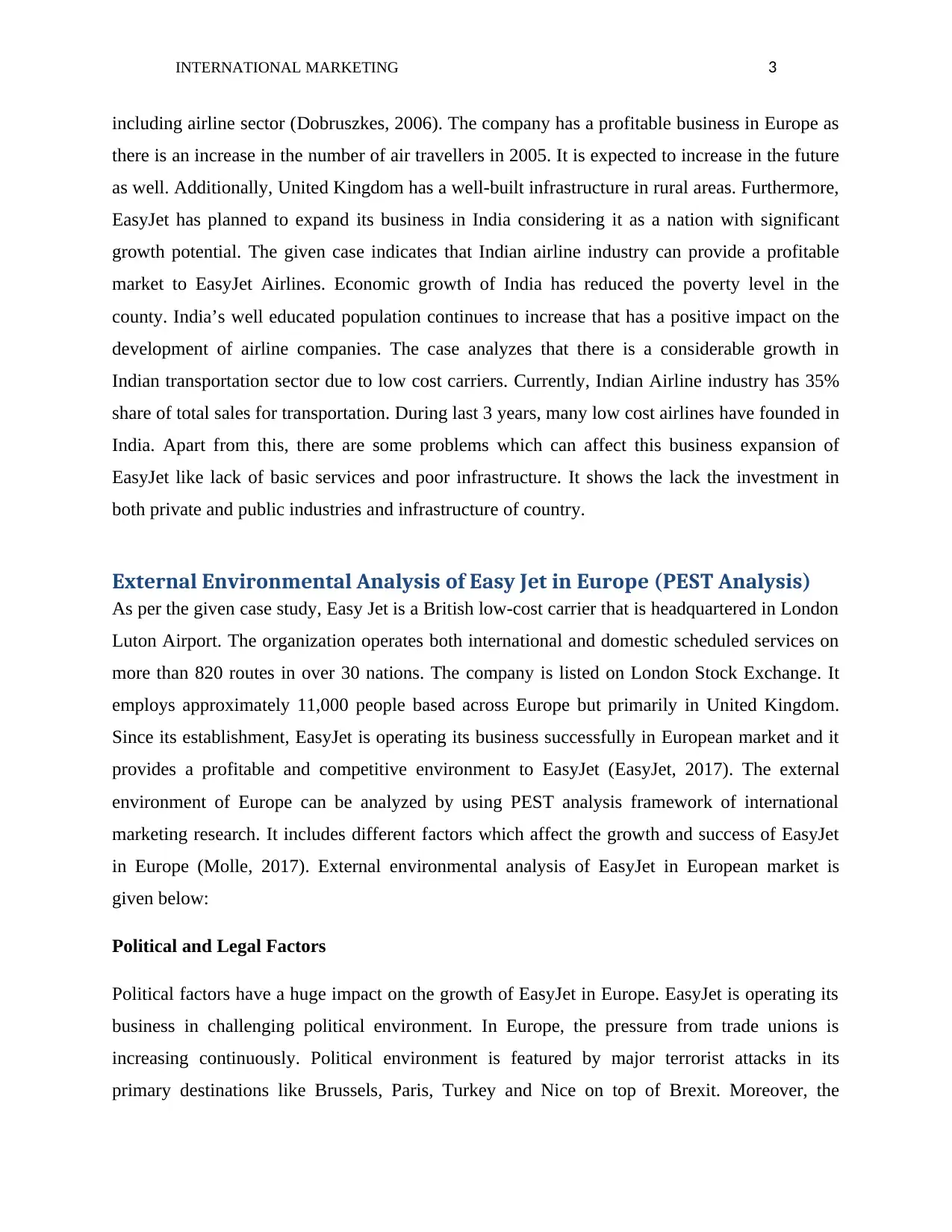
INTERNATIONAL MARKETING 3
including airline sector (Dobruszkes, 2006). The company has a profitable business in Europe as
there is an increase in the number of air travellers in 2005. It is expected to increase in the future
as well. Additionally, United Kingdom has a well-built infrastructure in rural areas. Furthermore,
EasyJet has planned to expand its business in India considering it as a nation with significant
growth potential. The given case indicates that Indian airline industry can provide a profitable
market to EasyJet Airlines. Economic growth of India has reduced the poverty level in the
county. India’s well educated population continues to increase that has a positive impact on the
development of airline companies. The case analyzes that there is a considerable growth in
Indian transportation sector due to low cost carriers. Currently, Indian Airline industry has 35%
share of total sales for transportation. During last 3 years, many low cost airlines have founded in
India. Apart from this, there are some problems which can affect this business expansion of
EasyJet like lack of basic services and poor infrastructure. It shows the lack the investment in
both private and public industries and infrastructure of country.
External Environmental Analysis of Easy Jet in Europe (PEST Analysis)
As per the given case study, Easy Jet is a British low-cost carrier that is headquartered in London
Luton Airport. The organization operates both international and domestic scheduled services on
more than 820 routes in over 30 nations. The company is listed on London Stock Exchange. It
employs approximately 11,000 people based across Europe but primarily in United Kingdom.
Since its establishment, EasyJet is operating its business successfully in European market and it
provides a profitable and competitive environment to EasyJet (EasyJet, 2017). The external
environment of Europe can be analyzed by using PEST analysis framework of international
marketing research. It includes different factors which affect the growth and success of EasyJet
in Europe (Molle, 2017). External environmental analysis of EasyJet in European market is
given below:
Political and Legal Factors
Political factors have a huge impact on the growth of EasyJet in Europe. EasyJet is operating its
business in challenging political environment. In Europe, the pressure from trade unions is
increasing continuously. Political environment is featured by major terrorist attacks in its
primary destinations like Brussels, Paris, Turkey and Nice on top of Brexit. Moreover, the
including airline sector (Dobruszkes, 2006). The company has a profitable business in Europe as
there is an increase in the number of air travellers in 2005. It is expected to increase in the future
as well. Additionally, United Kingdom has a well-built infrastructure in rural areas. Furthermore,
EasyJet has planned to expand its business in India considering it as a nation with significant
growth potential. The given case indicates that Indian airline industry can provide a profitable
market to EasyJet Airlines. Economic growth of India has reduced the poverty level in the
county. India’s well educated population continues to increase that has a positive impact on the
development of airline companies. The case analyzes that there is a considerable growth in
Indian transportation sector due to low cost carriers. Currently, Indian Airline industry has 35%
share of total sales for transportation. During last 3 years, many low cost airlines have founded in
India. Apart from this, there are some problems which can affect this business expansion of
EasyJet like lack of basic services and poor infrastructure. It shows the lack the investment in
both private and public industries and infrastructure of country.
External Environmental Analysis of Easy Jet in Europe (PEST Analysis)
As per the given case study, Easy Jet is a British low-cost carrier that is headquartered in London
Luton Airport. The organization operates both international and domestic scheduled services on
more than 820 routes in over 30 nations. The company is listed on London Stock Exchange. It
employs approximately 11,000 people based across Europe but primarily in United Kingdom.
Since its establishment, EasyJet is operating its business successfully in European market and it
provides a profitable and competitive environment to EasyJet (EasyJet, 2017). The external
environment of Europe can be analyzed by using PEST analysis framework of international
marketing research. It includes different factors which affect the growth and success of EasyJet
in Europe (Molle, 2017). External environmental analysis of EasyJet in European market is
given below:
Political and Legal Factors
Political factors have a huge impact on the growth of EasyJet in Europe. EasyJet is operating its
business in challenging political environment. In Europe, the pressure from trade unions is
increasing continuously. Political environment is featured by major terrorist attacks in its
primary destinations like Brussels, Paris, Turkey and Nice on top of Brexit. Moreover, the
Secure Best Marks with AI Grader
Need help grading? Try our AI Grader for instant feedback on your assignments.
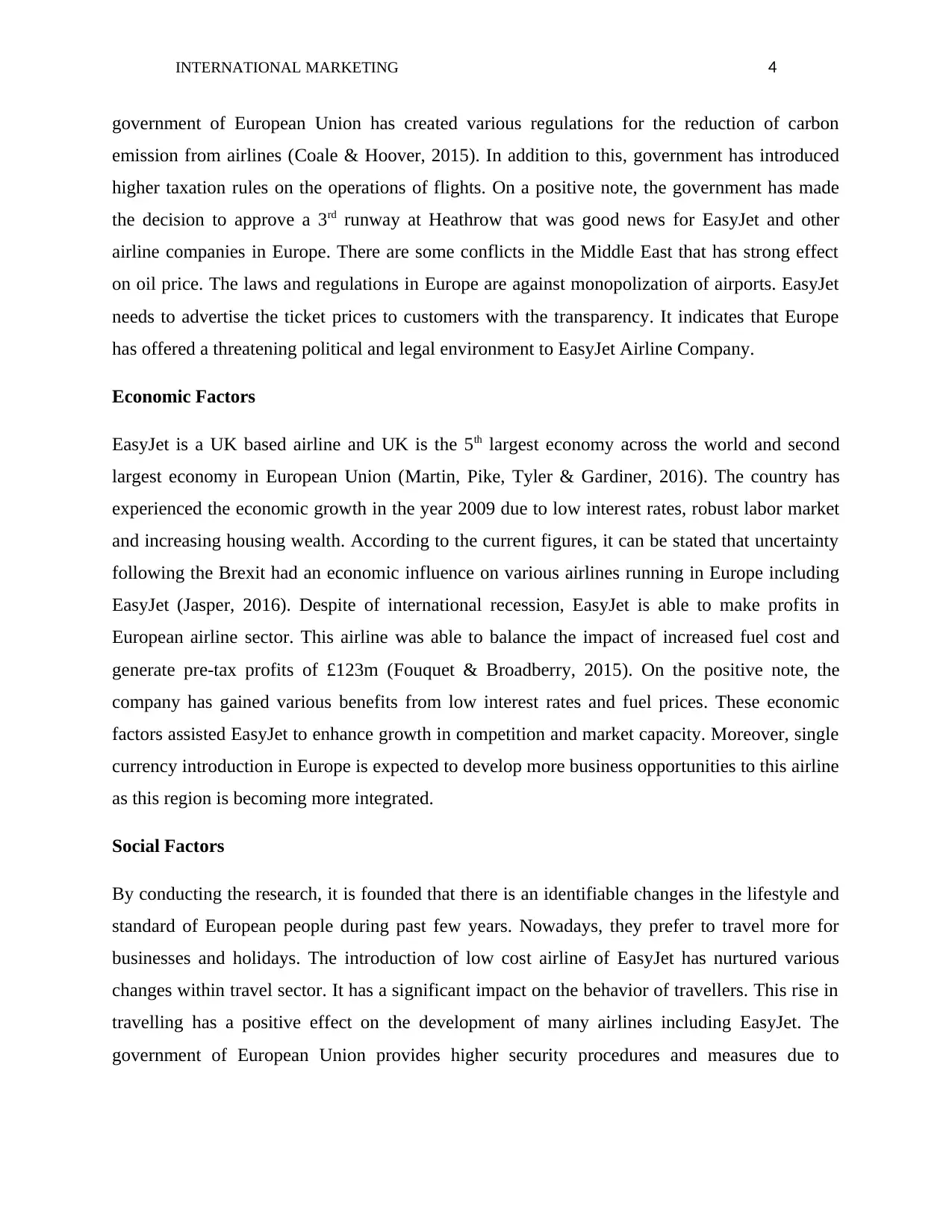
INTERNATIONAL MARKETING 4
government of European Union has created various regulations for the reduction of carbon
emission from airlines (Coale & Hoover, 2015). In addition to this, government has introduced
higher taxation rules on the operations of flights. On a positive note, the government has made
the decision to approve a 3rd runway at Heathrow that was good news for EasyJet and other
airline companies in Europe. There are some conflicts in the Middle East that has strong effect
on oil price. The laws and regulations in Europe are against monopolization of airports. EasyJet
needs to advertise the ticket prices to customers with the transparency. It indicates that Europe
has offered a threatening political and legal environment to EasyJet Airline Company.
Economic Factors
EasyJet is a UK based airline and UK is the 5th largest economy across the world and second
largest economy in European Union (Martin, Pike, Tyler & Gardiner, 2016). The country has
experienced the economic growth in the year 2009 due to low interest rates, robust labor market
and increasing housing wealth. According to the current figures, it can be stated that uncertainty
following the Brexit had an economic influence on various airlines running in Europe including
EasyJet (Jasper, 2016). Despite of international recession, EasyJet is able to make profits in
European airline sector. This airline was able to balance the impact of increased fuel cost and
generate pre-tax profits of £123m (Fouquet & Broadberry, 2015). On the positive note, the
company has gained various benefits from low interest rates and fuel prices. These economic
factors assisted EasyJet to enhance growth in competition and market capacity. Moreover, single
currency introduction in Europe is expected to develop more business opportunities to this airline
as this region is becoming more integrated.
Social Factors
By conducting the research, it is founded that there is an identifiable changes in the lifestyle and
standard of European people during past few years. Nowadays, they prefer to travel more for
businesses and holidays. The introduction of low cost airline of EasyJet has nurtured various
changes within travel sector. It has a significant impact on the behavior of travellers. This rise in
travelling has a positive effect on the development of many airlines including EasyJet. The
government of European Union provides higher security procedures and measures due to
government of European Union has created various regulations for the reduction of carbon
emission from airlines (Coale & Hoover, 2015). In addition to this, government has introduced
higher taxation rules on the operations of flights. On a positive note, the government has made
the decision to approve a 3rd runway at Heathrow that was good news for EasyJet and other
airline companies in Europe. There are some conflicts in the Middle East that has strong effect
on oil price. The laws and regulations in Europe are against monopolization of airports. EasyJet
needs to advertise the ticket prices to customers with the transparency. It indicates that Europe
has offered a threatening political and legal environment to EasyJet Airline Company.
Economic Factors
EasyJet is a UK based airline and UK is the 5th largest economy across the world and second
largest economy in European Union (Martin, Pike, Tyler & Gardiner, 2016). The country has
experienced the economic growth in the year 2009 due to low interest rates, robust labor market
and increasing housing wealth. According to the current figures, it can be stated that uncertainty
following the Brexit had an economic influence on various airlines running in Europe including
EasyJet (Jasper, 2016). Despite of international recession, EasyJet is able to make profits in
European airline sector. This airline was able to balance the impact of increased fuel cost and
generate pre-tax profits of £123m (Fouquet & Broadberry, 2015). On the positive note, the
company has gained various benefits from low interest rates and fuel prices. These economic
factors assisted EasyJet to enhance growth in competition and market capacity. Moreover, single
currency introduction in Europe is expected to develop more business opportunities to this airline
as this region is becoming more integrated.
Social Factors
By conducting the research, it is founded that there is an identifiable changes in the lifestyle and
standard of European people during past few years. Nowadays, they prefer to travel more for
businesses and holidays. The introduction of low cost airline of EasyJet has nurtured various
changes within travel sector. It has a significant impact on the behavior of travellers. This rise in
travelling has a positive effect on the development of many airlines including EasyJet. The
government of European Union provides higher security procedures and measures due to
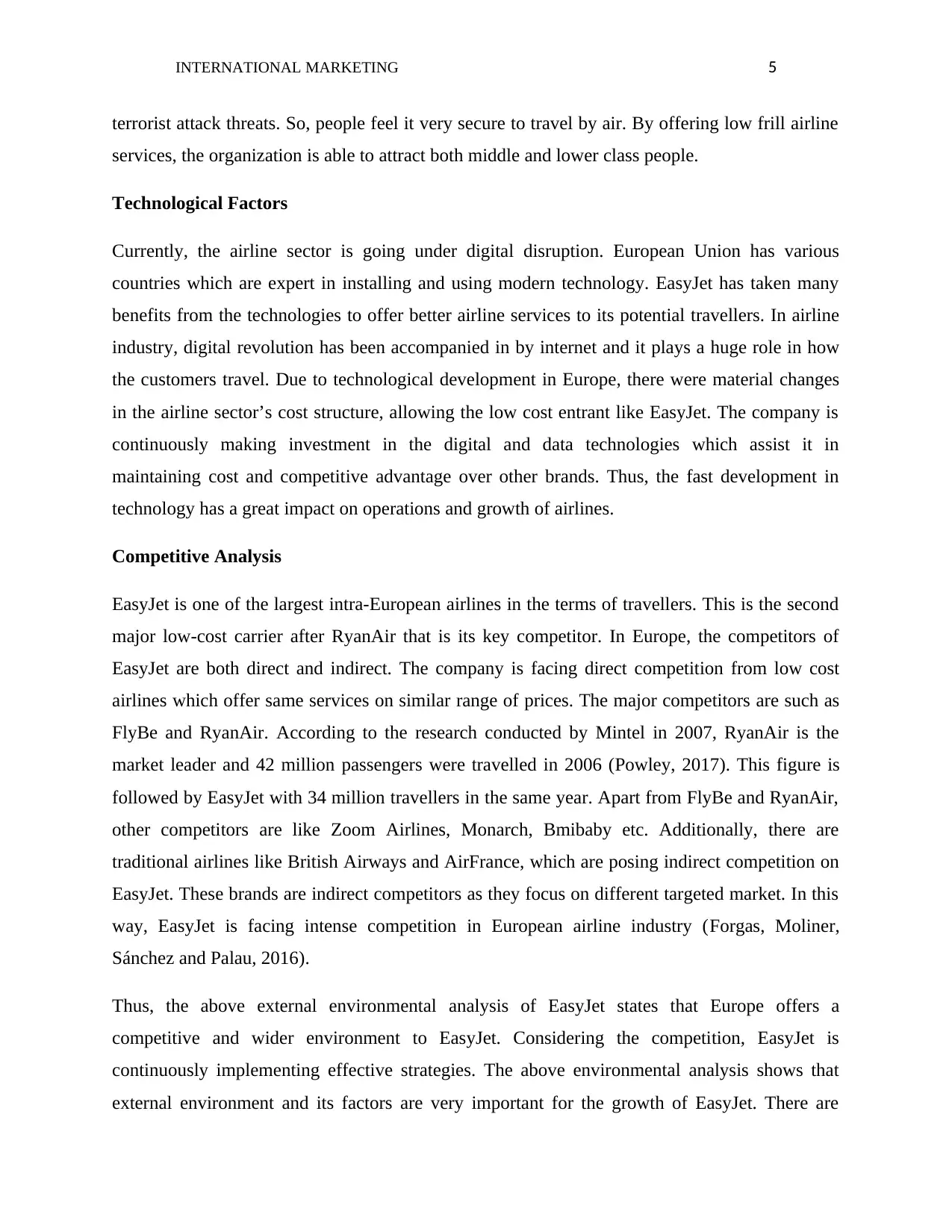
INTERNATIONAL MARKETING 5
terrorist attack threats. So, people feel it very secure to travel by air. By offering low frill airline
services, the organization is able to attract both middle and lower class people.
Technological Factors
Currently, the airline sector is going under digital disruption. European Union has various
countries which are expert in installing and using modern technology. EasyJet has taken many
benefits from the technologies to offer better airline services to its potential travellers. In airline
industry, digital revolution has been accompanied in by internet and it plays a huge role in how
the customers travel. Due to technological development in Europe, there were material changes
in the airline sector’s cost structure, allowing the low cost entrant like EasyJet. The company is
continuously making investment in the digital and data technologies which assist it in
maintaining cost and competitive advantage over other brands. Thus, the fast development in
technology has a great impact on operations and growth of airlines.
Competitive Analysis
EasyJet is one of the largest intra-European airlines in the terms of travellers. This is the second
major low-cost carrier after RyanAir that is its key competitor. In Europe, the competitors of
EasyJet are both direct and indirect. The company is facing direct competition from low cost
airlines which offer same services on similar range of prices. The major competitors are such as
FlyBe and RyanAir. According to the research conducted by Mintel in 2007, RyanAir is the
market leader and 42 million passengers were travelled in 2006 (Powley, 2017). This figure is
followed by EasyJet with 34 million travellers in the same year. Apart from FlyBe and RyanAir,
other competitors are like Zoom Airlines, Monarch, Bmibaby etc. Additionally, there are
traditional airlines like British Airways and AirFrance, which are posing indirect competition on
EasyJet. These brands are indirect competitors as they focus on different targeted market. In this
way, EasyJet is facing intense competition in European airline industry (Forgas, Moliner,
Sánchez and Palau, 2016).
Thus, the above external environmental analysis of EasyJet states that Europe offers a
competitive and wider environment to EasyJet. Considering the competition, EasyJet is
continuously implementing effective strategies. The above environmental analysis shows that
external environment and its factors are very important for the growth of EasyJet. There are
terrorist attack threats. So, people feel it very secure to travel by air. By offering low frill airline
services, the organization is able to attract both middle and lower class people.
Technological Factors
Currently, the airline sector is going under digital disruption. European Union has various
countries which are expert in installing and using modern technology. EasyJet has taken many
benefits from the technologies to offer better airline services to its potential travellers. In airline
industry, digital revolution has been accompanied in by internet and it plays a huge role in how
the customers travel. Due to technological development in Europe, there were material changes
in the airline sector’s cost structure, allowing the low cost entrant like EasyJet. The company is
continuously making investment in the digital and data technologies which assist it in
maintaining cost and competitive advantage over other brands. Thus, the fast development in
technology has a great impact on operations and growth of airlines.
Competitive Analysis
EasyJet is one of the largest intra-European airlines in the terms of travellers. This is the second
major low-cost carrier after RyanAir that is its key competitor. In Europe, the competitors of
EasyJet are both direct and indirect. The company is facing direct competition from low cost
airlines which offer same services on similar range of prices. The major competitors are such as
FlyBe and RyanAir. According to the research conducted by Mintel in 2007, RyanAir is the
market leader and 42 million passengers were travelled in 2006 (Powley, 2017). This figure is
followed by EasyJet with 34 million travellers in the same year. Apart from FlyBe and RyanAir,
other competitors are like Zoom Airlines, Monarch, Bmibaby etc. Additionally, there are
traditional airlines like British Airways and AirFrance, which are posing indirect competition on
EasyJet. These brands are indirect competitors as they focus on different targeted market. In this
way, EasyJet is facing intense competition in European airline industry (Forgas, Moliner,
Sánchez and Palau, 2016).
Thus, the above external environmental analysis of EasyJet states that Europe offers a
competitive and wider environment to EasyJet. Considering the competition, EasyJet is
continuously implementing effective strategies. The above environmental analysis shows that
external environment and its factors are very important for the growth of EasyJet. There are
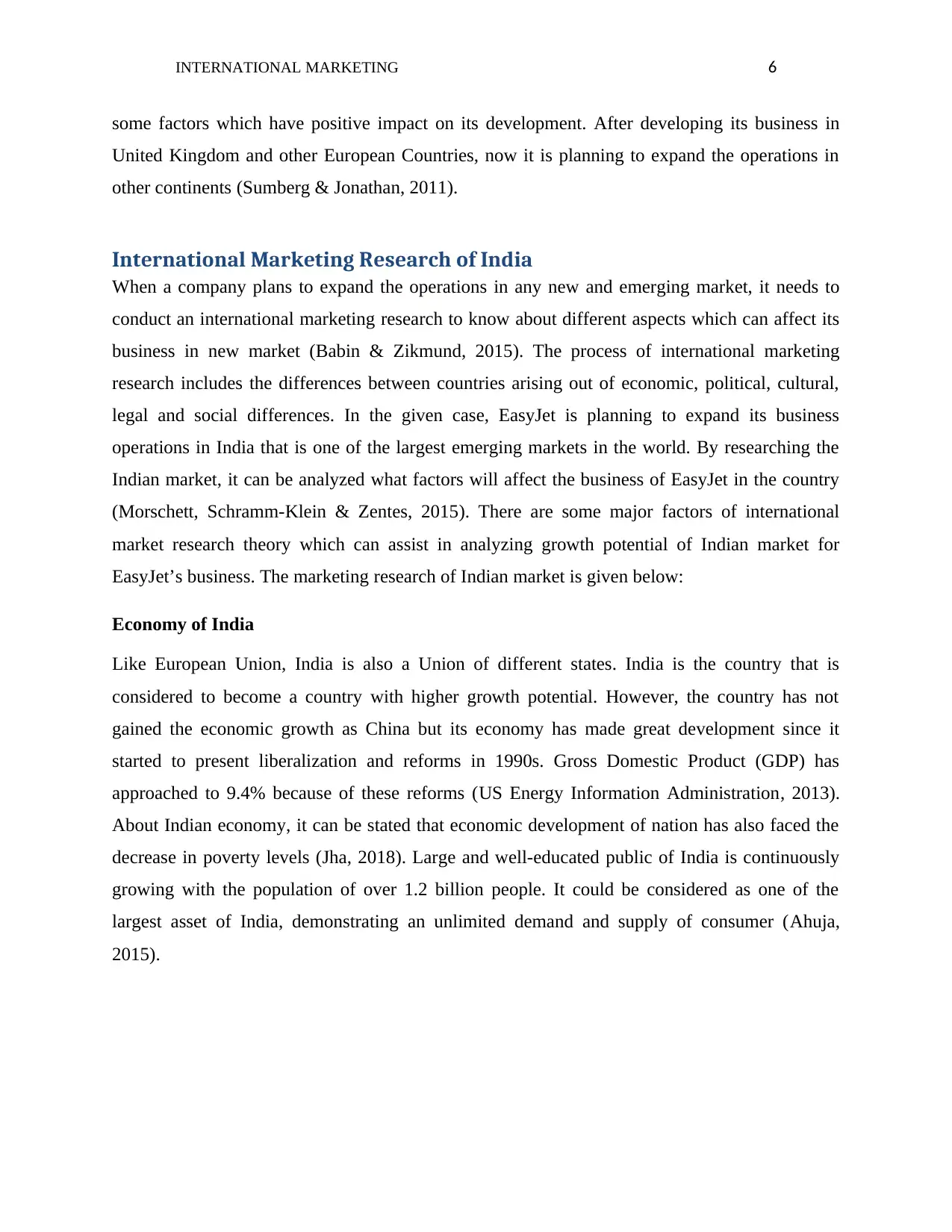
INTERNATIONAL MARKETING 6
some factors which have positive impact on its development. After developing its business in
United Kingdom and other European Countries, now it is planning to expand the operations in
other continents (Sumberg & Jonathan, 2011).
International Marketing Research of India
When a company plans to expand the operations in any new and emerging market, it needs to
conduct an international marketing research to know about different aspects which can affect its
business in new market (Babin & Zikmund, 2015). The process of international marketing
research includes the differences between countries arising out of economic, political, cultural,
legal and social differences. In the given case, EasyJet is planning to expand its business
operations in India that is one of the largest emerging markets in the world. By researching the
Indian market, it can be analyzed what factors will affect the business of EasyJet in the country
(Morschett, Schramm-Klein & Zentes, 2015). There are some major factors of international
market research theory which can assist in analyzing growth potential of Indian market for
EasyJet’s business. The marketing research of Indian market is given below:
Economy of India
Like European Union, India is also a Union of different states. India is the country that is
considered to become a country with higher growth potential. However, the country has not
gained the economic growth as China but its economy has made great development since it
started to present liberalization and reforms in 1990s. Gross Domestic Product (GDP) has
approached to 9.4% because of these reforms (US Energy Information Administration, 2013).
About Indian economy, it can be stated that economic development of nation has also faced the
decrease in poverty levels (Jha, 2018). Large and well-educated public of India is continuously
growing with the population of over 1.2 billion people. It could be considered as one of the
largest asset of India, demonstrating an unlimited demand and supply of consumer (Ahuja,
2015).
some factors which have positive impact on its development. After developing its business in
United Kingdom and other European Countries, now it is planning to expand the operations in
other continents (Sumberg & Jonathan, 2011).
International Marketing Research of India
When a company plans to expand the operations in any new and emerging market, it needs to
conduct an international marketing research to know about different aspects which can affect its
business in new market (Babin & Zikmund, 2015). The process of international marketing
research includes the differences between countries arising out of economic, political, cultural,
legal and social differences. In the given case, EasyJet is planning to expand its business
operations in India that is one of the largest emerging markets in the world. By researching the
Indian market, it can be analyzed what factors will affect the business of EasyJet in the country
(Morschett, Schramm-Klein & Zentes, 2015). There are some major factors of international
market research theory which can assist in analyzing growth potential of Indian market for
EasyJet’s business. The marketing research of Indian market is given below:
Economy of India
Like European Union, India is also a Union of different states. India is the country that is
considered to become a country with higher growth potential. However, the country has not
gained the economic growth as China but its economy has made great development since it
started to present liberalization and reforms in 1990s. Gross Domestic Product (GDP) has
approached to 9.4% because of these reforms (US Energy Information Administration, 2013).
About Indian economy, it can be stated that economic development of nation has also faced the
decrease in poverty levels (Jha, 2018). Large and well-educated public of India is continuously
growing with the population of over 1.2 billion people. It could be considered as one of the
largest asset of India, demonstrating an unlimited demand and supply of consumer (Ahuja,
2015).
Paraphrase This Document
Need a fresh take? Get an instant paraphrase of this document with our AI Paraphraser
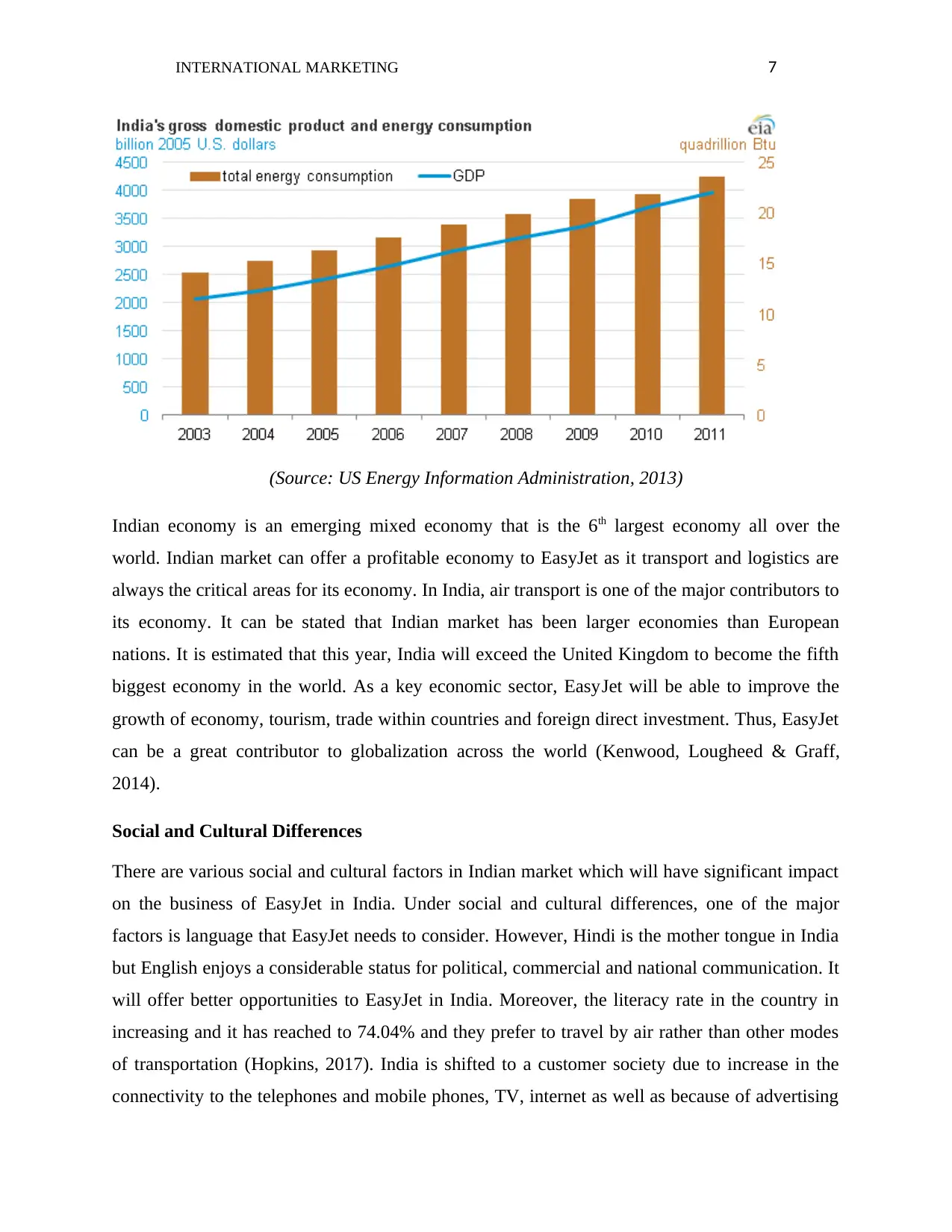
INTERNATIONAL MARKETING 7
(Source: US Energy Information Administration, 2013)
Indian economy is an emerging mixed economy that is the 6th largest economy all over the
world. Indian market can offer a profitable economy to EasyJet as it transport and logistics are
always the critical areas for its economy. In India, air transport is one of the major contributors to
its economy. It can be stated that Indian market has been larger economies than European
nations. It is estimated that this year, India will exceed the United Kingdom to become the fifth
biggest economy in the world. As a key economic sector, EasyJet will be able to improve the
growth of economy, tourism, trade within countries and foreign direct investment. Thus, EasyJet
can be a great contributor to globalization across the world (Kenwood, Lougheed & Graff,
2014).
Social and Cultural Differences
There are various social and cultural factors in Indian market which will have significant impact
on the business of EasyJet in India. Under social and cultural differences, one of the major
factors is language that EasyJet needs to consider. However, Hindi is the mother tongue in India
but English enjoys a considerable status for political, commercial and national communication. It
will offer better opportunities to EasyJet in India. Moreover, the literacy rate in the country in
increasing and it has reached to 74.04% and they prefer to travel by air rather than other modes
of transportation (Hopkins, 2017). India is shifted to a customer society due to increase in the
connectivity to the telephones and mobile phones, TV, internet as well as because of advertising
(Source: US Energy Information Administration, 2013)
Indian economy is an emerging mixed economy that is the 6th largest economy all over the
world. Indian market can offer a profitable economy to EasyJet as it transport and logistics are
always the critical areas for its economy. In India, air transport is one of the major contributors to
its economy. It can be stated that Indian market has been larger economies than European
nations. It is estimated that this year, India will exceed the United Kingdom to become the fifth
biggest economy in the world. As a key economic sector, EasyJet will be able to improve the
growth of economy, tourism, trade within countries and foreign direct investment. Thus, EasyJet
can be a great contributor to globalization across the world (Kenwood, Lougheed & Graff,
2014).
Social and Cultural Differences
There are various social and cultural factors in Indian market which will have significant impact
on the business of EasyJet in India. Under social and cultural differences, one of the major
factors is language that EasyJet needs to consider. However, Hindi is the mother tongue in India
but English enjoys a considerable status for political, commercial and national communication. It
will offer better opportunities to EasyJet in India. Moreover, the literacy rate in the country in
increasing and it has reached to 74.04% and they prefer to travel by air rather than other modes
of transportation (Hopkins, 2017). India is shifted to a customer society due to increase in the
connectivity to the telephones and mobile phones, TV, internet as well as because of advertising
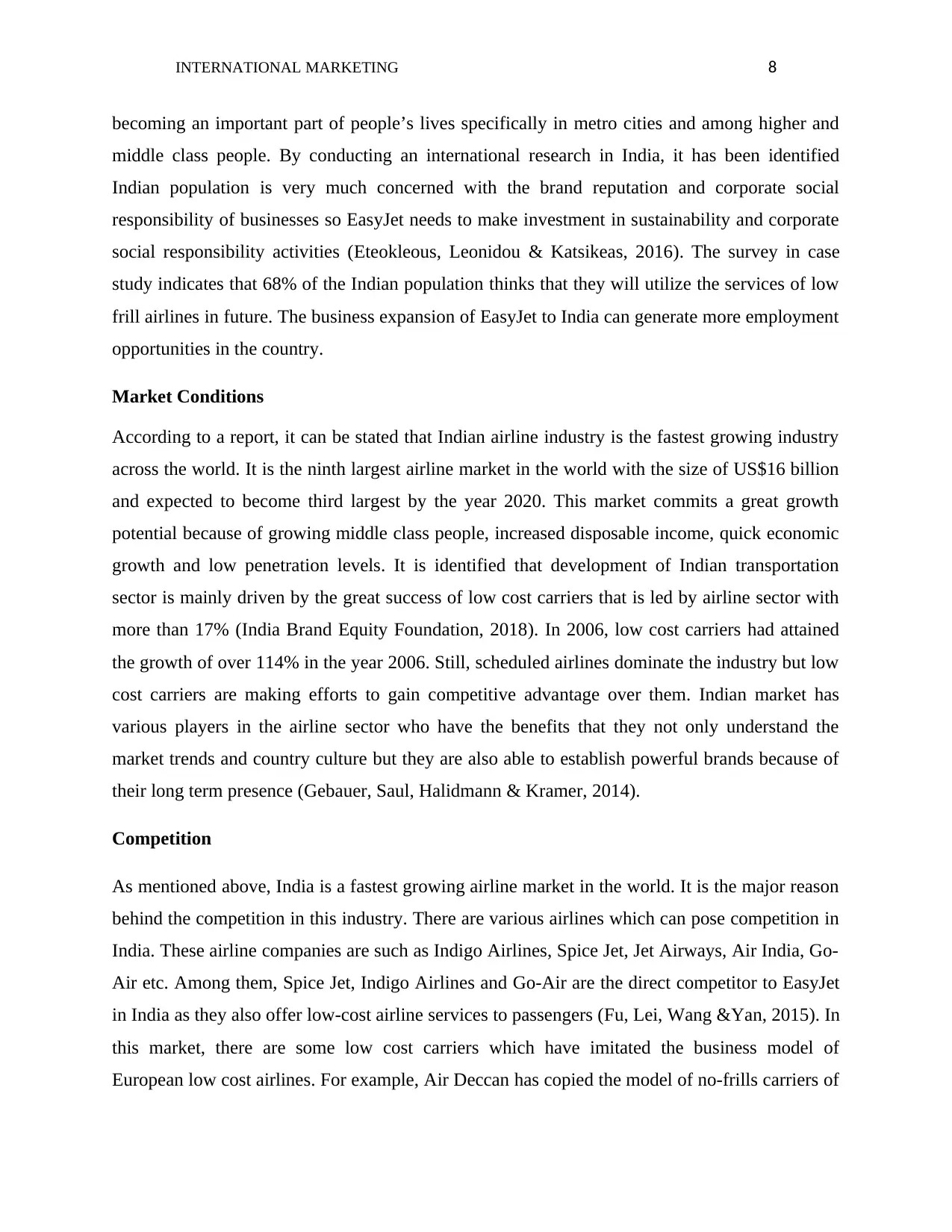
INTERNATIONAL MARKETING 8
becoming an important part of people’s lives specifically in metro cities and among higher and
middle class people. By conducting an international research in India, it has been identified
Indian population is very much concerned with the brand reputation and corporate social
responsibility of businesses so EasyJet needs to make investment in sustainability and corporate
social responsibility activities (Eteokleous, Leonidou & Katsikeas, 2016). The survey in case
study indicates that 68% of the Indian population thinks that they will utilize the services of low
frill airlines in future. The business expansion of EasyJet to India can generate more employment
opportunities in the country.
Market Conditions
According to a report, it can be stated that Indian airline industry is the fastest growing industry
across the world. It is the ninth largest airline market in the world with the size of US$16 billion
and expected to become third largest by the year 2020. This market commits a great growth
potential because of growing middle class people, increased disposable income, quick economic
growth and low penetration levels. It is identified that development of Indian transportation
sector is mainly driven by the great success of low cost carriers that is led by airline sector with
more than 17% (India Brand Equity Foundation, 2018). In 2006, low cost carriers had attained
the growth of over 114% in the year 2006. Still, scheduled airlines dominate the industry but low
cost carriers are making efforts to gain competitive advantage over them. Indian market has
various players in the airline sector who have the benefits that they not only understand the
market trends and country culture but they are also able to establish powerful brands because of
their long term presence (Gebauer, Saul, Halidmann & Kramer, 2014).
Competition
As mentioned above, India is a fastest growing airline market in the world. It is the major reason
behind the competition in this industry. There are various airlines which can pose competition in
India. These airline companies are such as Indigo Airlines, Spice Jet, Jet Airways, Air India, Go-
Air etc. Among them, Spice Jet, Indigo Airlines and Go-Air are the direct competitor to EasyJet
in India as they also offer low-cost airline services to passengers (Fu, Lei, Wang &Yan, 2015). In
this market, there are some low cost carriers which have imitated the business model of
European low cost airlines. For example, Air Deccan has copied the model of no-frills carriers of
becoming an important part of people’s lives specifically in metro cities and among higher and
middle class people. By conducting an international research in India, it has been identified
Indian population is very much concerned with the brand reputation and corporate social
responsibility of businesses so EasyJet needs to make investment in sustainability and corporate
social responsibility activities (Eteokleous, Leonidou & Katsikeas, 2016). The survey in case
study indicates that 68% of the Indian population thinks that they will utilize the services of low
frill airlines in future. The business expansion of EasyJet to India can generate more employment
opportunities in the country.
Market Conditions
According to a report, it can be stated that Indian airline industry is the fastest growing industry
across the world. It is the ninth largest airline market in the world with the size of US$16 billion
and expected to become third largest by the year 2020. This market commits a great growth
potential because of growing middle class people, increased disposable income, quick economic
growth and low penetration levels. It is identified that development of Indian transportation
sector is mainly driven by the great success of low cost carriers that is led by airline sector with
more than 17% (India Brand Equity Foundation, 2018). In 2006, low cost carriers had attained
the growth of over 114% in the year 2006. Still, scheduled airlines dominate the industry but low
cost carriers are making efforts to gain competitive advantage over them. Indian market has
various players in the airline sector who have the benefits that they not only understand the
market trends and country culture but they are also able to establish powerful brands because of
their long term presence (Gebauer, Saul, Halidmann & Kramer, 2014).
Competition
As mentioned above, India is a fastest growing airline market in the world. It is the major reason
behind the competition in this industry. There are various airlines which can pose competition in
India. These airline companies are such as Indigo Airlines, Spice Jet, Jet Airways, Air India, Go-
Air etc. Among them, Spice Jet, Indigo Airlines and Go-Air are the direct competitor to EasyJet
in India as they also offer low-cost airline services to passengers (Fu, Lei, Wang &Yan, 2015). In
this market, there are some low cost carriers which have imitated the business model of
European low cost airlines. For example, Air Deccan has copied the model of no-frills carriers of
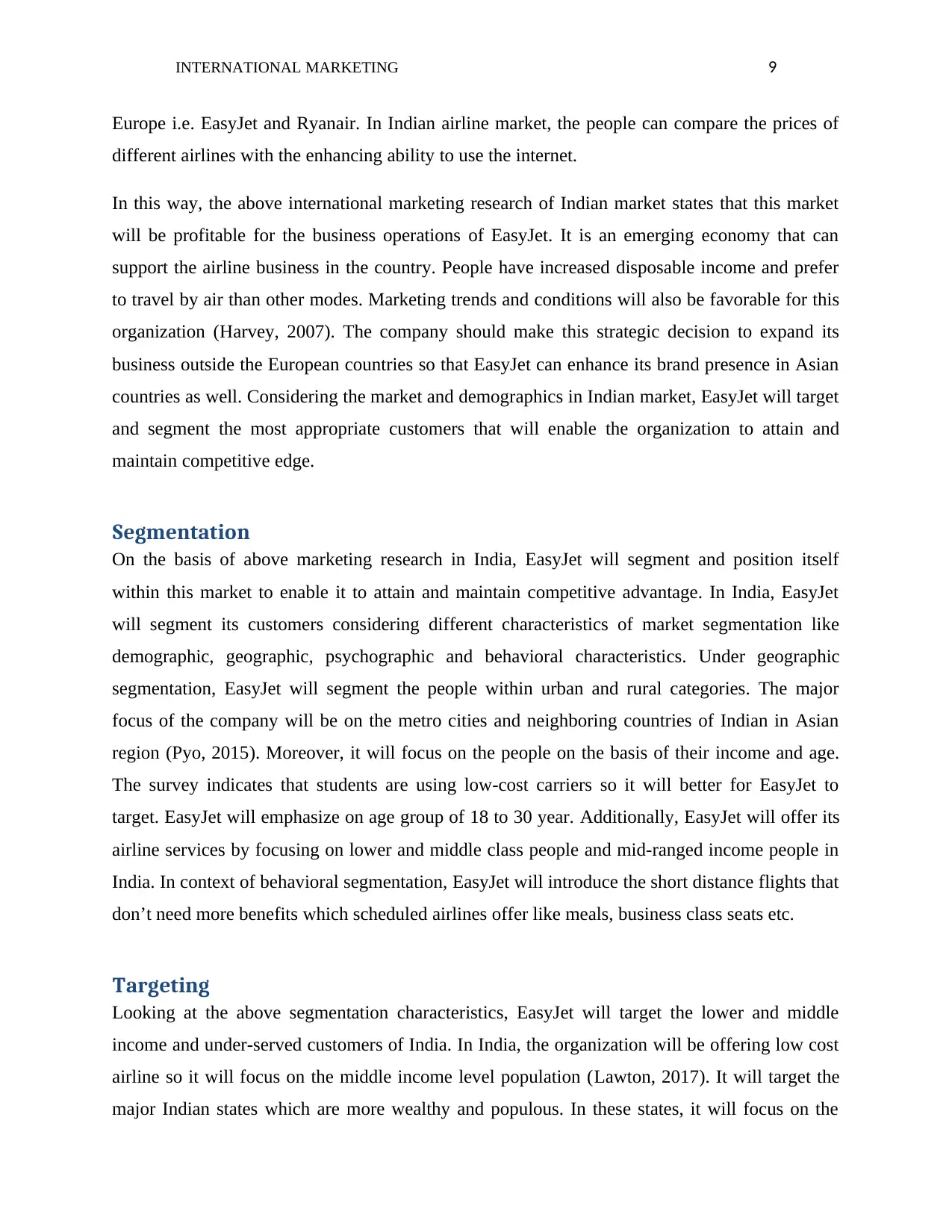
INTERNATIONAL MARKETING 9
Europe i.e. EasyJet and Ryanair. In Indian airline market, the people can compare the prices of
different airlines with the enhancing ability to use the internet.
In this way, the above international marketing research of Indian market states that this market
will be profitable for the business operations of EasyJet. It is an emerging economy that can
support the airline business in the country. People have increased disposable income and prefer
to travel by air than other modes. Marketing trends and conditions will also be favorable for this
organization (Harvey, 2007). The company should make this strategic decision to expand its
business outside the European countries so that EasyJet can enhance its brand presence in Asian
countries as well. Considering the market and demographics in Indian market, EasyJet will target
and segment the most appropriate customers that will enable the organization to attain and
maintain competitive edge.
Segmentation
On the basis of above marketing research in India, EasyJet will segment and position itself
within this market to enable it to attain and maintain competitive advantage. In India, EasyJet
will segment its customers considering different characteristics of market segmentation like
demographic, geographic, psychographic and behavioral characteristics. Under geographic
segmentation, EasyJet will segment the people within urban and rural categories. The major
focus of the company will be on the metro cities and neighboring countries of Indian in Asian
region (Pyo, 2015). Moreover, it will focus on the people on the basis of their income and age.
The survey indicates that students are using low-cost carriers so it will better for EasyJet to
target. EasyJet will emphasize on age group of 18 to 30 year. Additionally, EasyJet will offer its
airline services by focusing on lower and middle class people and mid-ranged income people in
India. In context of behavioral segmentation, EasyJet will introduce the short distance flights that
don’t need more benefits which scheduled airlines offer like meals, business class seats etc.
Targeting
Looking at the above segmentation characteristics, EasyJet will target the lower and middle
income and under-served customers of India. In India, the organization will be offering low cost
airline so it will focus on the middle income level population (Lawton, 2017). It will target the
major Indian states which are more wealthy and populous. In these states, it will focus on the
Europe i.e. EasyJet and Ryanair. In Indian airline market, the people can compare the prices of
different airlines with the enhancing ability to use the internet.
In this way, the above international marketing research of Indian market states that this market
will be profitable for the business operations of EasyJet. It is an emerging economy that can
support the airline business in the country. People have increased disposable income and prefer
to travel by air than other modes. Marketing trends and conditions will also be favorable for this
organization (Harvey, 2007). The company should make this strategic decision to expand its
business outside the European countries so that EasyJet can enhance its brand presence in Asian
countries as well. Considering the market and demographics in Indian market, EasyJet will target
and segment the most appropriate customers that will enable the organization to attain and
maintain competitive edge.
Segmentation
On the basis of above marketing research in India, EasyJet will segment and position itself
within this market to enable it to attain and maintain competitive advantage. In India, EasyJet
will segment its customers considering different characteristics of market segmentation like
demographic, geographic, psychographic and behavioral characteristics. Under geographic
segmentation, EasyJet will segment the people within urban and rural categories. The major
focus of the company will be on the metro cities and neighboring countries of Indian in Asian
region (Pyo, 2015). Moreover, it will focus on the people on the basis of their income and age.
The survey indicates that students are using low-cost carriers so it will better for EasyJet to
target. EasyJet will emphasize on age group of 18 to 30 year. Additionally, EasyJet will offer its
airline services by focusing on lower and middle class people and mid-ranged income people in
India. In context of behavioral segmentation, EasyJet will introduce the short distance flights that
don’t need more benefits which scheduled airlines offer like meals, business class seats etc.
Targeting
Looking at the above segmentation characteristics, EasyJet will target the lower and middle
income and under-served customers of India. In India, the organization will be offering low cost
airline so it will focus on the middle income level population (Lawton, 2017). It will target the
major Indian states which are more wealthy and populous. In these states, it will focus on the
Secure Best Marks with AI Grader
Need help grading? Try our AI Grader for instant feedback on your assignments.
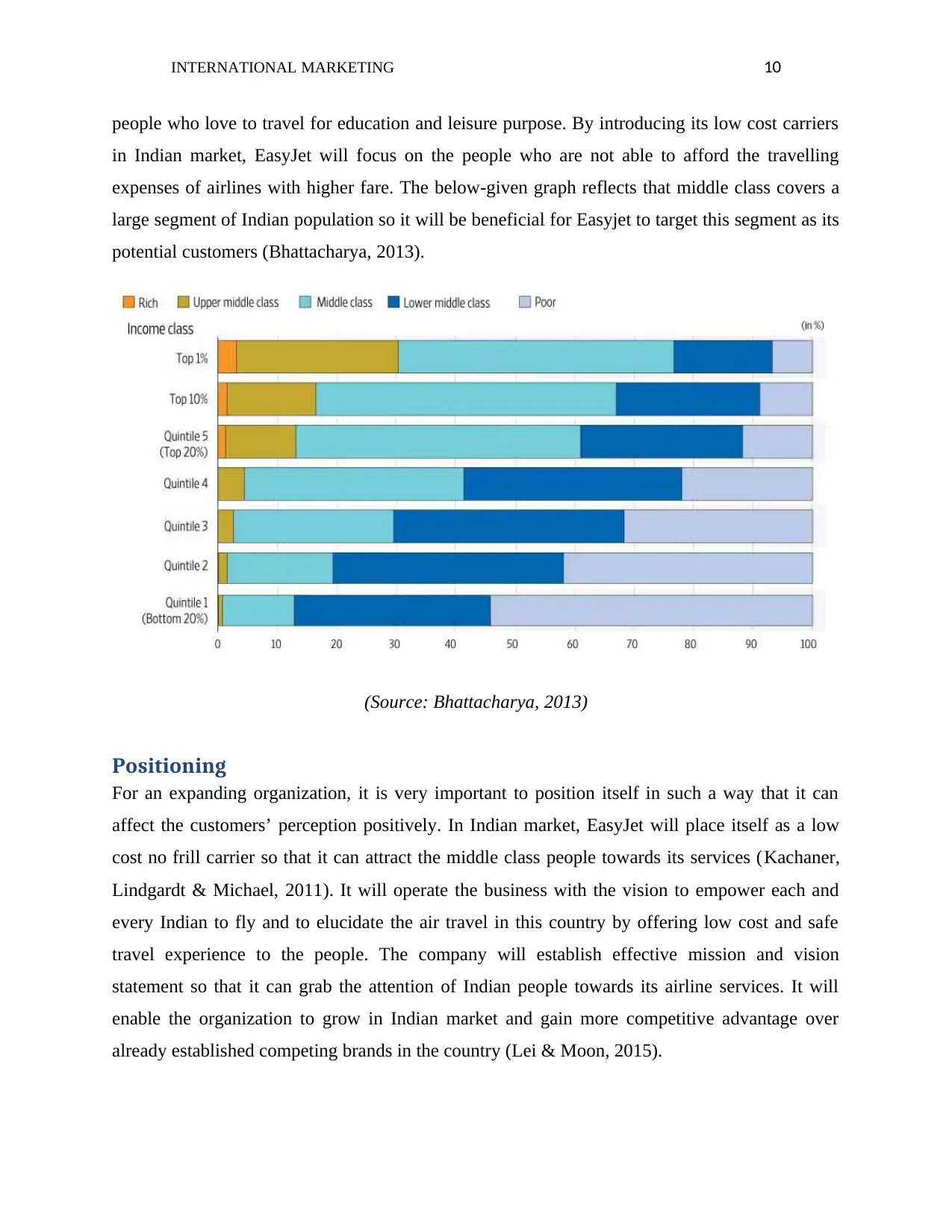
INTERNATIONAL MARKETING 10
people who love to travel for education and leisure purpose. By introducing its low cost carriers
in Indian market, EasyJet will focus on the people who are not able to afford the travelling
expenses of airlines with higher fare. The below-given graph reflects that middle class covers a
large segment of Indian population so it will be beneficial for Easyjet to target this segment as its
potential customers (Bhattacharya, 2013).
(Source: Bhattacharya, 2013)
Positioning
For an expanding organization, it is very important to position itself in such a way that it can
affect the customers’ perception positively. In Indian market, EasyJet will place itself as a low
cost no frill carrier so that it can attract the middle class people towards its services (Kachaner,
Lindgardt & Michael, 2011). It will operate the business with the vision to empower each and
every Indian to fly and to elucidate the air travel in this country by offering low cost and safe
travel experience to the people. The company will establish effective mission and vision
statement so that it can grab the attention of Indian people towards its airline services. It will
enable the organization to grow in Indian market and gain more competitive advantage over
already established competing brands in the country (Lei & Moon, 2015).
people who love to travel for education and leisure purpose. By introducing its low cost carriers
in Indian market, EasyJet will focus on the people who are not able to afford the travelling
expenses of airlines with higher fare. The below-given graph reflects that middle class covers a
large segment of Indian population so it will be beneficial for Easyjet to target this segment as its
potential customers (Bhattacharya, 2013).
(Source: Bhattacharya, 2013)
Positioning
For an expanding organization, it is very important to position itself in such a way that it can
affect the customers’ perception positively. In Indian market, EasyJet will place itself as a low
cost no frill carrier so that it can attract the middle class people towards its services (Kachaner,
Lindgardt & Michael, 2011). It will operate the business with the vision to empower each and
every Indian to fly and to elucidate the air travel in this country by offering low cost and safe
travel experience to the people. The company will establish effective mission and vision
statement so that it can grab the attention of Indian people towards its airline services. It will
enable the organization to grow in Indian market and gain more competitive advantage over
already established competing brands in the country (Lei & Moon, 2015).
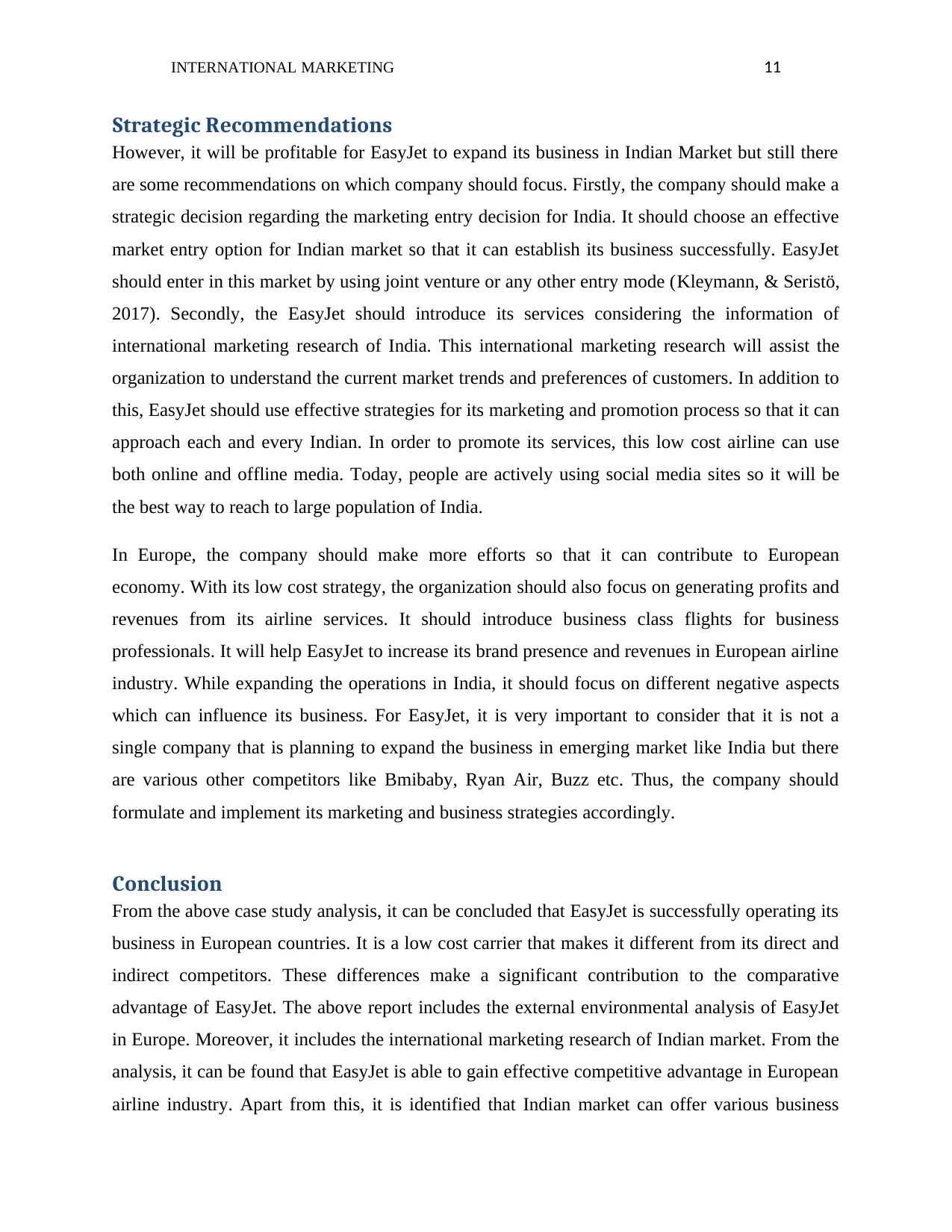
INTERNATIONAL MARKETING 11
Strategic Recommendations
However, it will be profitable for EasyJet to expand its business in Indian Market but still there
are some recommendations on which company should focus. Firstly, the company should make a
strategic decision regarding the marketing entry decision for India. It should choose an effective
market entry option for Indian market so that it can establish its business successfully. EasyJet
should enter in this market by using joint venture or any other entry mode (Kleymann, & Seristö,
2017). Secondly, the EasyJet should introduce its services considering the information of
international marketing research of India. This international marketing research will assist the
organization to understand the current market trends and preferences of customers. In addition to
this, EasyJet should use effective strategies for its marketing and promotion process so that it can
approach each and every Indian. In order to promote its services, this low cost airline can use
both online and offline media. Today, people are actively using social media sites so it will be
the best way to reach to large population of India.
In Europe, the company should make more efforts so that it can contribute to European
economy. With its low cost strategy, the organization should also focus on generating profits and
revenues from its airline services. It should introduce business class flights for business
professionals. It will help EasyJet to increase its brand presence and revenues in European airline
industry. While expanding the operations in India, it should focus on different negative aspects
which can influence its business. For EasyJet, it is very important to consider that it is not a
single company that is planning to expand the business in emerging market like India but there
are various other competitors like Bmibaby, Ryan Air, Buzz etc. Thus, the company should
formulate and implement its marketing and business strategies accordingly.
Conclusion
From the above case study analysis, it can be concluded that EasyJet is successfully operating its
business in European countries. It is a low cost carrier that makes it different from its direct and
indirect competitors. These differences make a significant contribution to the comparative
advantage of EasyJet. The above report includes the external environmental analysis of EasyJet
in Europe. Moreover, it includes the international marketing research of Indian market. From the
analysis, it can be found that EasyJet is able to gain effective competitive advantage in European
airline industry. Apart from this, it is identified that Indian market can offer various business
Strategic Recommendations
However, it will be profitable for EasyJet to expand its business in Indian Market but still there
are some recommendations on which company should focus. Firstly, the company should make a
strategic decision regarding the marketing entry decision for India. It should choose an effective
market entry option for Indian market so that it can establish its business successfully. EasyJet
should enter in this market by using joint venture or any other entry mode (Kleymann, & Seristö,
2017). Secondly, the EasyJet should introduce its services considering the information of
international marketing research of India. This international marketing research will assist the
organization to understand the current market trends and preferences of customers. In addition to
this, EasyJet should use effective strategies for its marketing and promotion process so that it can
approach each and every Indian. In order to promote its services, this low cost airline can use
both online and offline media. Today, people are actively using social media sites so it will be
the best way to reach to large population of India.
In Europe, the company should make more efforts so that it can contribute to European
economy. With its low cost strategy, the organization should also focus on generating profits and
revenues from its airline services. It should introduce business class flights for business
professionals. It will help EasyJet to increase its brand presence and revenues in European airline
industry. While expanding the operations in India, it should focus on different negative aspects
which can influence its business. For EasyJet, it is very important to consider that it is not a
single company that is planning to expand the business in emerging market like India but there
are various other competitors like Bmibaby, Ryan Air, Buzz etc. Thus, the company should
formulate and implement its marketing and business strategies accordingly.
Conclusion
From the above case study analysis, it can be concluded that EasyJet is successfully operating its
business in European countries. It is a low cost carrier that makes it different from its direct and
indirect competitors. These differences make a significant contribution to the comparative
advantage of EasyJet. The above report includes the external environmental analysis of EasyJet
in Europe. Moreover, it includes the international marketing research of Indian market. From the
analysis, it can be found that EasyJet is able to gain effective competitive advantage in European
airline industry. Apart from this, it is identified that Indian market can offer various business
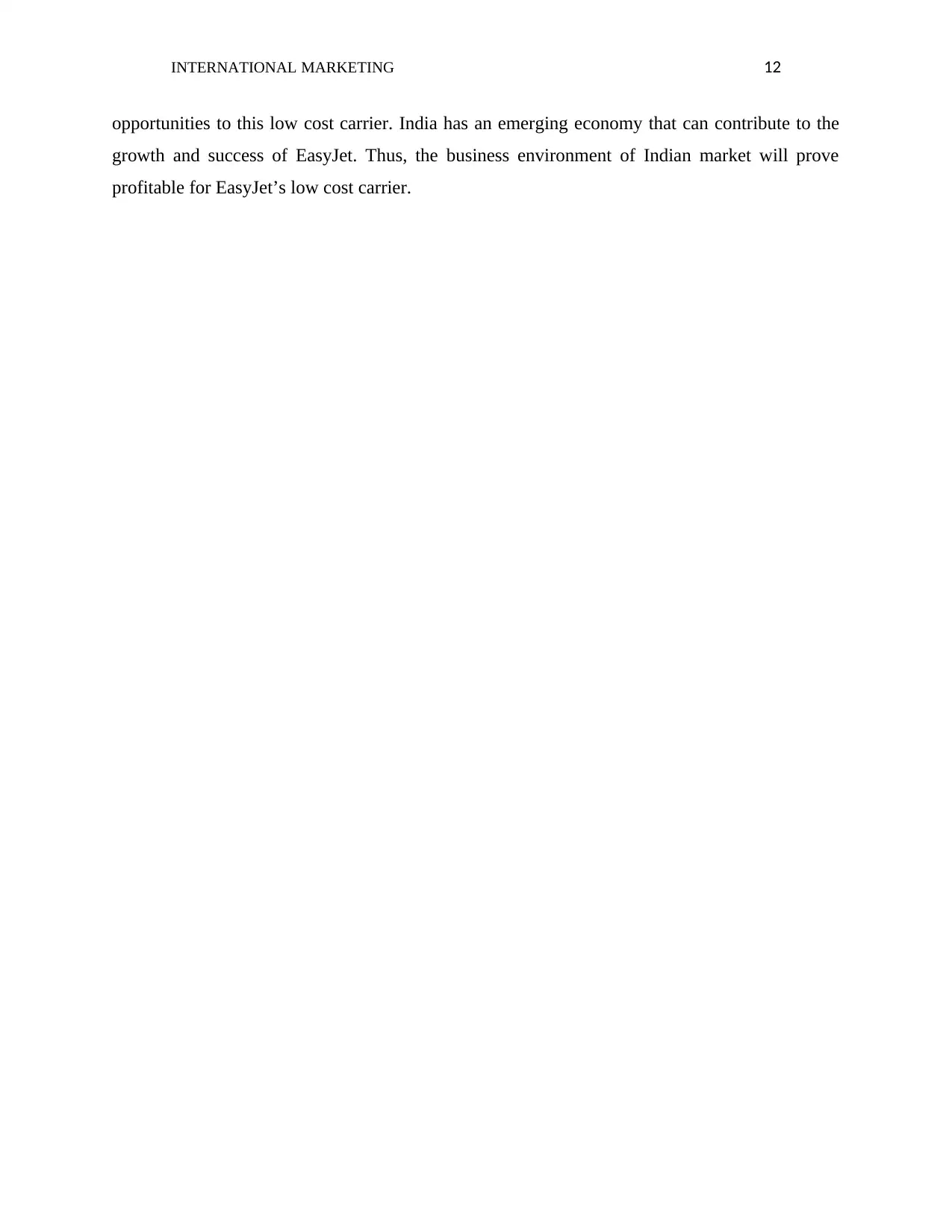
INTERNATIONAL MARKETING 12
opportunities to this low cost carrier. India has an emerging economy that can contribute to the
growth and success of EasyJet. Thus, the business environment of Indian market will prove
profitable for EasyJet’s low cost carrier.
opportunities to this low cost carrier. India has an emerging economy that can contribute to the
growth and success of EasyJet. Thus, the business environment of Indian market will prove
profitable for EasyJet’s low cost carrier.
Paraphrase This Document
Need a fresh take? Get an instant paraphrase of this document with our AI Paraphraser
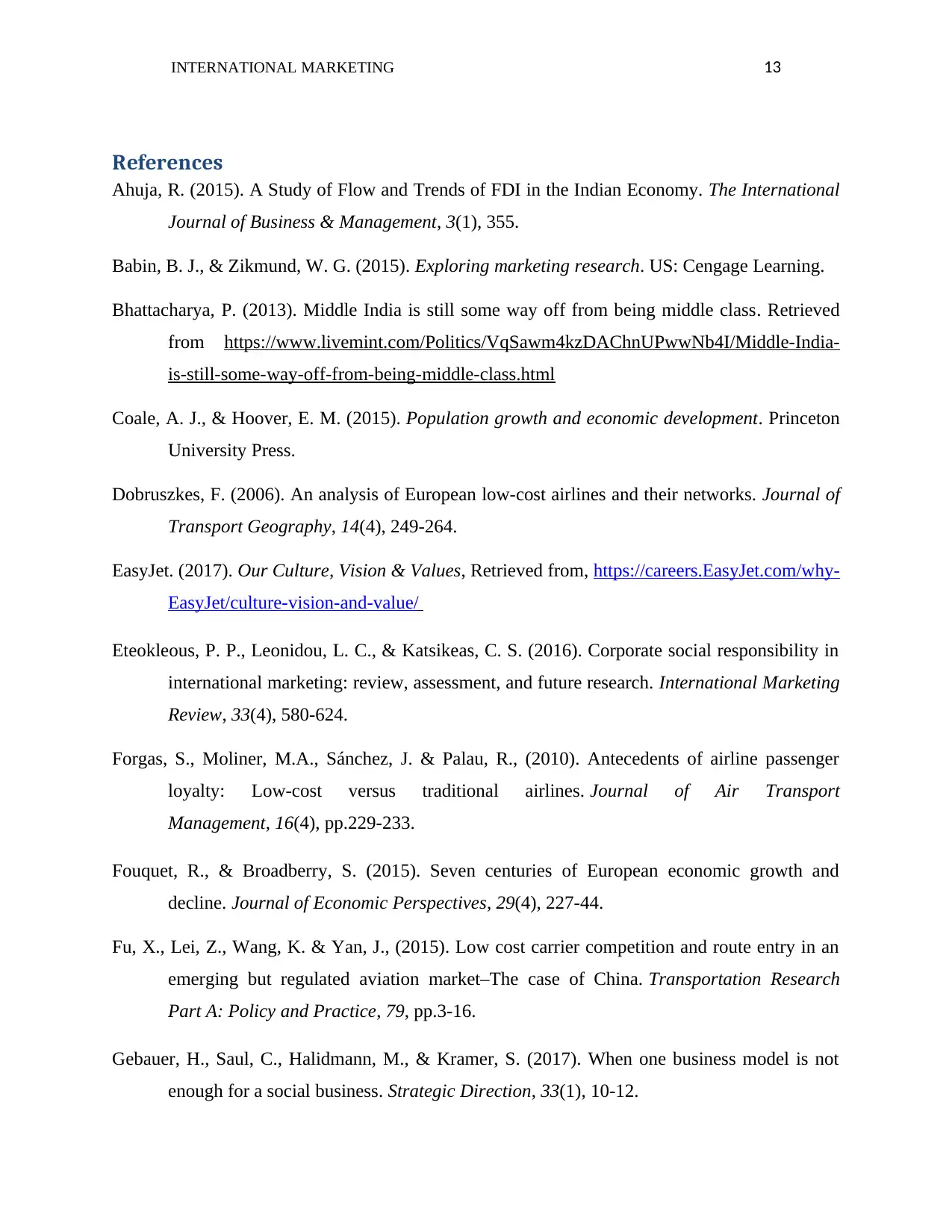
INTERNATIONAL MARKETING 13
References
Ahuja, R. (2015). A Study of Flow and Trends of FDI in the Indian Economy. The International
Journal of Business & Management, 3(1), 355.
Babin, B. J., & Zikmund, W. G. (2015). Exploring marketing research. US: Cengage Learning.
Bhattacharya, P. (2013). Middle India is still some way off from being middle class. Retrieved
from https://www.livemint.com/Politics/VqSawm4kzDAChnUPwwNb4I/Middle-India-
is-still-some-way-off-from-being-middle-class.html
Coale, A. J., & Hoover, E. M. (2015). Population growth and economic development. Princeton
University Press.
Dobruszkes, F. (2006). An analysis of European low-cost airlines and their networks. Journal of
Transport Geography, 14(4), 249-264.
EasyJet. (2017). Our Culture, Vision & Values, Retrieved from, https://careers.EasyJet.com/why-
EasyJet/culture-vision-and-value/
Eteokleous, P. P., Leonidou, L. C., & Katsikeas, C. S. (2016). Corporate social responsibility in
international marketing: review, assessment, and future research. International Marketing
Review, 33(4), 580-624.
Forgas, S., Moliner, M.A., Sánchez, J. & Palau, R., (2010). Antecedents of airline passenger
loyalty: Low-cost versus traditional airlines. Journal of Air Transport
Management, 16(4), pp.229-233.
Fouquet, R., & Broadberry, S. (2015). Seven centuries of European economic growth and
decline. Journal of Economic Perspectives, 29(4), 227-44.
Fu, X., Lei, Z., Wang, K. & Yan, J., (2015). Low cost carrier competition and route entry in an
emerging but regulated aviation market–The case of China. Transportation Research
Part A: Policy and Practice, 79, pp.3-16.
Gebauer, H., Saul, C., Halidmann, M., & Kramer, S. (2017). When one business model is not
enough for a social business. Strategic Direction, 33(1), 10-12.
References
Ahuja, R. (2015). A Study of Flow and Trends of FDI in the Indian Economy. The International
Journal of Business & Management, 3(1), 355.
Babin, B. J., & Zikmund, W. G. (2015). Exploring marketing research. US: Cengage Learning.
Bhattacharya, P. (2013). Middle India is still some way off from being middle class. Retrieved
from https://www.livemint.com/Politics/VqSawm4kzDAChnUPwwNb4I/Middle-India-
is-still-some-way-off-from-being-middle-class.html
Coale, A. J., & Hoover, E. M. (2015). Population growth and economic development. Princeton
University Press.
Dobruszkes, F. (2006). An analysis of European low-cost airlines and their networks. Journal of
Transport Geography, 14(4), 249-264.
EasyJet. (2017). Our Culture, Vision & Values, Retrieved from, https://careers.EasyJet.com/why-
EasyJet/culture-vision-and-value/
Eteokleous, P. P., Leonidou, L. C., & Katsikeas, C. S. (2016). Corporate social responsibility in
international marketing: review, assessment, and future research. International Marketing
Review, 33(4), 580-624.
Forgas, S., Moliner, M.A., Sánchez, J. & Palau, R., (2010). Antecedents of airline passenger
loyalty: Low-cost versus traditional airlines. Journal of Air Transport
Management, 16(4), pp.229-233.
Fouquet, R., & Broadberry, S. (2015). Seven centuries of European economic growth and
decline. Journal of Economic Perspectives, 29(4), 227-44.
Fu, X., Lei, Z., Wang, K. & Yan, J., (2015). Low cost carrier competition and route entry in an
emerging but regulated aviation market–The case of China. Transportation Research
Part A: Policy and Practice, 79, pp.3-16.
Gebauer, H., Saul, C., Halidmann, M., & Kramer, S. (2017). When one business model is not
enough for a social business. Strategic Direction, 33(1), 10-12.
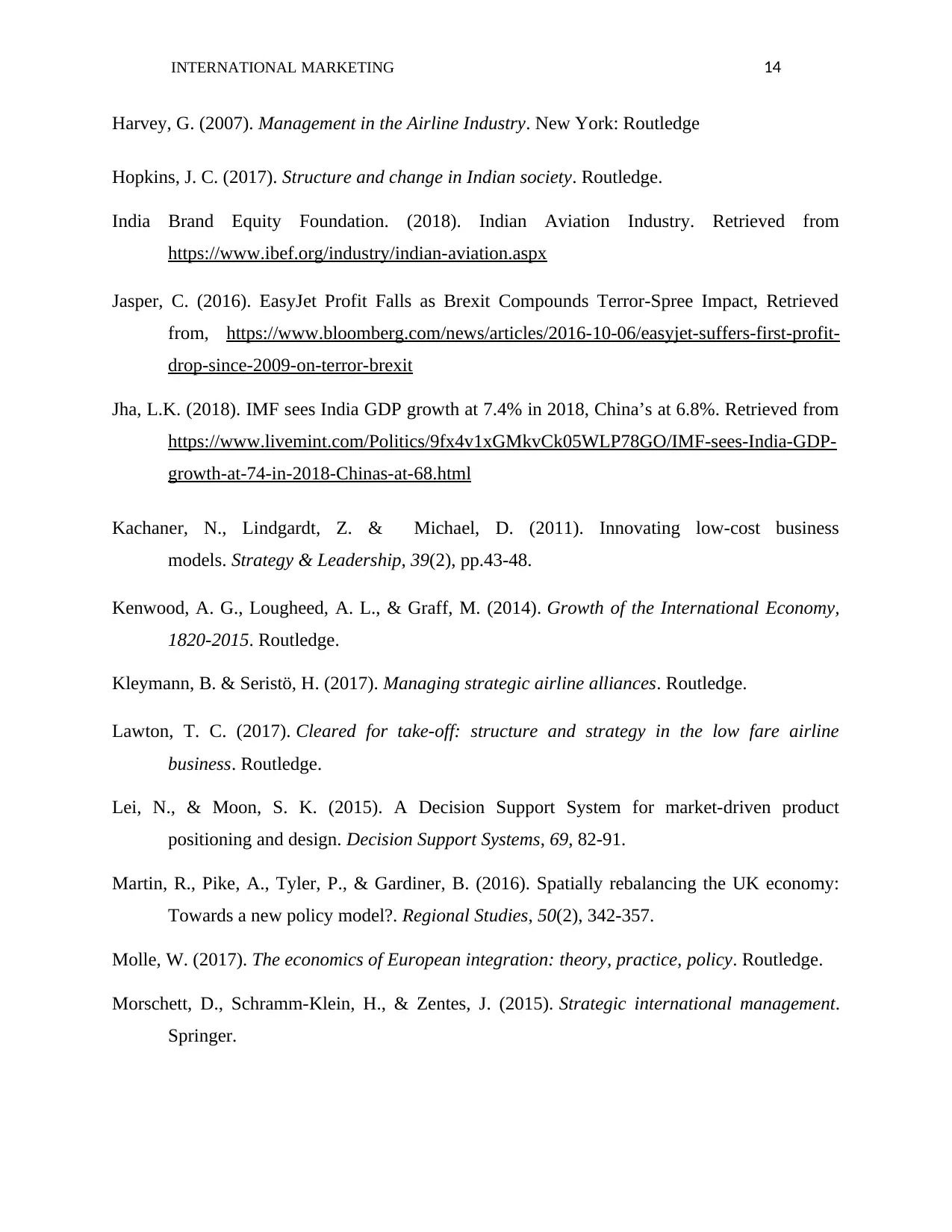
INTERNATIONAL MARKETING 14
Harvey, G. (2007). Management in the Airline Industry. New York: Routledge
Hopkins, J. C. (2017). Structure and change in Indian society. Routledge.
India Brand Equity Foundation. (2018). Indian Aviation Industry. Retrieved from
https://www.ibef.org/industry/indian-aviation.aspx
Jasper, C. (2016). EasyJet Profit Falls as Brexit Compounds Terror-Spree Impact, Retrieved
from, https://www.bloomberg.com/news/articles/2016-10-06/easyjet-suffers-first-profit-
drop-since-2009-on-terror-brexit
Jha, L.K. (2018). IMF sees India GDP growth at 7.4% in 2018, China’s at 6.8%. Retrieved from
https://www.livemint.com/Politics/9fx4v1xGMkvCk05WLP78GO/IMF-sees-India-GDP-
growth-at-74-in-2018-Chinas-at-68.html
Kachaner, N., Lindgardt, Z. & Michael, D. (2011). Innovating low-cost business
models. Strategy & Leadership, 39(2), pp.43-48.
Kenwood, A. G., Lougheed, A. L., & Graff, M. (2014). Growth of the International Economy,
1820-2015. Routledge.
Kleymann, B. & Seristö, H. (2017). Managing strategic airline alliances. Routledge.
Lawton, T. C. (2017). Cleared for take-off: structure and strategy in the low fare airline
business. Routledge.
Lei, N., & Moon, S. K. (2015). A Decision Support System for market-driven product
positioning and design. Decision Support Systems, 69, 82-91.
Martin, R., Pike, A., Tyler, P., & Gardiner, B. (2016). Spatially rebalancing the UK economy:
Towards a new policy model?. Regional Studies, 50(2), 342-357.
Molle, W. (2017). The economics of European integration: theory, practice, policy. Routledge.
Morschett, D., Schramm-Klein, H., & Zentes, J. (2015). Strategic international management.
Springer.
Harvey, G. (2007). Management in the Airline Industry. New York: Routledge
Hopkins, J. C. (2017). Structure and change in Indian society. Routledge.
India Brand Equity Foundation. (2018). Indian Aviation Industry. Retrieved from
https://www.ibef.org/industry/indian-aviation.aspx
Jasper, C. (2016). EasyJet Profit Falls as Brexit Compounds Terror-Spree Impact, Retrieved
from, https://www.bloomberg.com/news/articles/2016-10-06/easyjet-suffers-first-profit-
drop-since-2009-on-terror-brexit
Jha, L.K. (2018). IMF sees India GDP growth at 7.4% in 2018, China’s at 6.8%. Retrieved from
https://www.livemint.com/Politics/9fx4v1xGMkvCk05WLP78GO/IMF-sees-India-GDP-
growth-at-74-in-2018-Chinas-at-68.html
Kachaner, N., Lindgardt, Z. & Michael, D. (2011). Innovating low-cost business
models. Strategy & Leadership, 39(2), pp.43-48.
Kenwood, A. G., Lougheed, A. L., & Graff, M. (2014). Growth of the International Economy,
1820-2015. Routledge.
Kleymann, B. & Seristö, H. (2017). Managing strategic airline alliances. Routledge.
Lawton, T. C. (2017). Cleared for take-off: structure and strategy in the low fare airline
business. Routledge.
Lei, N., & Moon, S. K. (2015). A Decision Support System for market-driven product
positioning and design. Decision Support Systems, 69, 82-91.
Martin, R., Pike, A., Tyler, P., & Gardiner, B. (2016). Spatially rebalancing the UK economy:
Towards a new policy model?. Regional Studies, 50(2), 342-357.
Molle, W. (2017). The economics of European integration: theory, practice, policy. Routledge.
Morschett, D., Schramm-Klein, H., & Zentes, J. (2015). Strategic international management.
Springer.
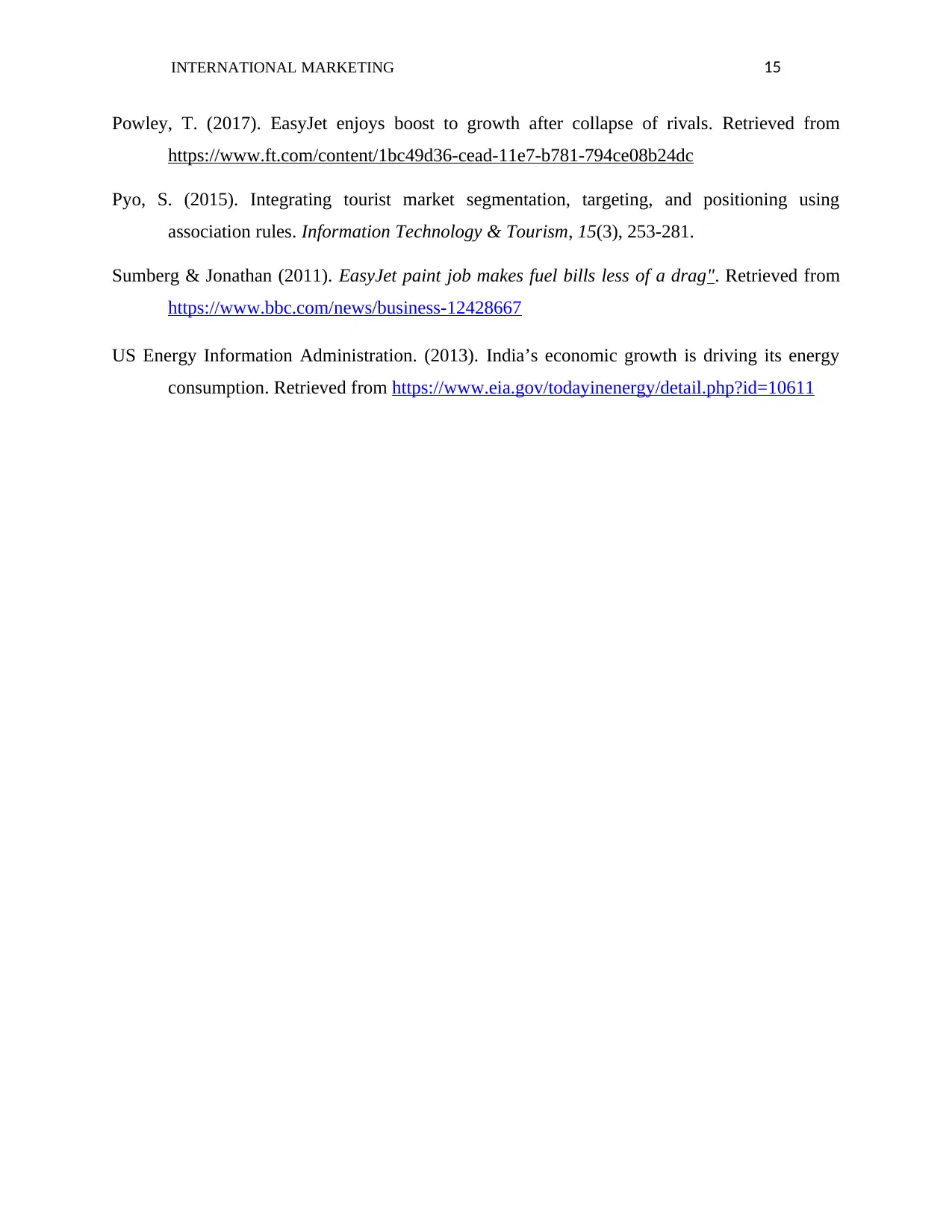
INTERNATIONAL MARKETING 15
Powley, T. (2017). EasyJet enjoys boost to growth after collapse of rivals. Retrieved from
https://www.ft.com/content/1bc49d36-cead-11e7-b781-794ce08b24dc
Pyo, S. (2015). Integrating tourist market segmentation, targeting, and positioning using
association rules. Information Technology & Tourism, 15(3), 253-281.
Sumberg & Jonathan (2011). EasyJet paint job makes fuel bills less of a drag". Retrieved from
https://www.bbc.com/news/business-12428667
US Energy Information Administration. (2013). India’s economic growth is driving its energy
consumption. Retrieved from https://www.eia.gov/todayinenergy/detail.php?id=10611
Powley, T. (2017). EasyJet enjoys boost to growth after collapse of rivals. Retrieved from
https://www.ft.com/content/1bc49d36-cead-11e7-b781-794ce08b24dc
Pyo, S. (2015). Integrating tourist market segmentation, targeting, and positioning using
association rules. Information Technology & Tourism, 15(3), 253-281.
Sumberg & Jonathan (2011). EasyJet paint job makes fuel bills less of a drag". Retrieved from
https://www.bbc.com/news/business-12428667
US Energy Information Administration. (2013). India’s economic growth is driving its energy
consumption. Retrieved from https://www.eia.gov/todayinenergy/detail.php?id=10611
Secure Best Marks with AI Grader
Need help grading? Try our AI Grader for instant feedback on your assignments.

INTERNATIONAL MARKETING 16

INTERNATIONAL MARKETING 17

INTERNATIONAL MARKETING 18
1 out of 19
Related Documents
Your All-in-One AI-Powered Toolkit for Academic Success.
+13062052269
info@desklib.com
Available 24*7 on WhatsApp / Email
![[object Object]](/_next/static/media/star-bottom.7253800d.svg)
Unlock your academic potential
© 2024 | Zucol Services PVT LTD | All rights reserved.





